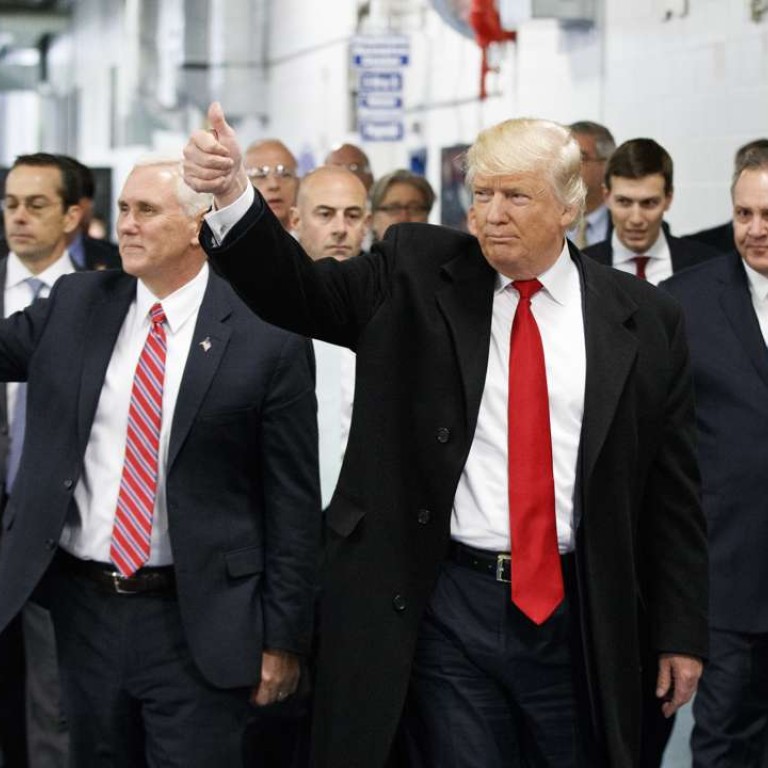
Donald Trump needs to call China... on its failure to become equally open to US companies
‘This new administration will attempt to show that pragmatism and opportunism are more important than ideology’
Provocative tweets and phone calls from president-elect Donald Trump flow daily from Trump Tower and he has not even been sworn in as president yet. China received a taste of his unorthodox view of diplomacy when he took a call from Taiwan’s president. But that was just the opening salvo in his crusade to “Make America Great Again- The White House Years”.
The president-elect is demonstrating his determination to shape US trade with China in ways that are politically more direct than previous administrations have been willing to try. He repeats threats of unleashing steep, blanket tariffs to penalise imports to the US. And his disposition to wield political coercion over business matters isn’t limited to trade.
Does anyone seriously believe that Baidu would exist if Google could freely compete with them in China?
Trump showed he isn’t afraid to lean directly on US companies that aren’t behaving as he demands. On Tuesday, he used Twitter to pressure Boeing for a discount on the new Air Force One. Last week, Friday, he promised “retribution” against firms that lay off employees or move factories overseas.
This sounds much like how Beijing officials exercise political suasion over mainland companies- without the WeChat. Trump brazenly uses his Twitter account, shaming American CEOs and corporations as if they were his trade subcontractors to one of his casinos.
Trump arrives when the dynamic between the two countries is changing. For decades, Democrats and Republicans have tried to encourage a more open China by increasing trade and attracting it to the benefits of an open economy. They hoped that eventually, China’s huge domestic market would become equally open to US companies and investment. But that has not occurred, especially over the last few years.
The US tech industry, which bet heavily on Hillary Clinton in the months leading up to the presidential election, is looking towards the incoming Trump administration for support in major trade and investment issues with China.

China’s stringent cybersecurity regulations force US tech firms to conduct business through Chinese partners and slow down their growth in China. Demands include submitting source code and security checks- very risky in a country with little intellectual property protection. Basically, you hand over your technology and risk getting cut out of the market.
New technologies created a paradox where they connected the world, but they also enabled governments to entirely dictate the local terms of connectivity and access. Foreign tech companies have told me that restrictions have been troublesome and frustrating, that every possible roadblock is thrown up in China to confound them. One of them said, “Does anyone seriously believe that Baidu would exist if Google could freely compete with them in China?”
One of the few exceptions for financial software vendors emerged in the know-your-client and anti-money laundering areas where Chinese officials waived demands because they needed immediate access to advanced software and global databases to chase corrupt officials abroad.
Even Germany, one of the most open countries for foreign direct investment, has complained about how China has been acquiring important technology while protecting its own companies against foreign takeovers with “discriminatory requirements,” according to German Minister for Economic Affairs and Energy Sigmar Gabriel.
Americans have already surrendered much of their manufacturing and supply chain expertise to China. And after providing them with technology and financial expertise and becoming their debtor, America might as well become a serf of the Chinese state.
Trump could easily block US tech acquisitions by Chinese companies. The most vulnerable victims would Chinese tech companies seeking international expansion such as Baidu, Alibaba and Tencent. In exchange, he could immediately demand a level playing field and liberalisation of restrictions against US tech companies.
The tech elite are already flocking to Trump Tower to gain his blessing and penance. Donald Trump has praised a pledge from Masayoshi Son’s new SoftBank fund to invest US$50 billion in the US over the next four years. It is supposed to back tech companies and startups. Yet, these kinds of funds don’t necessarily create many of jobs Trump envisioned.
This new administration attempts to show that pragmatism and opportunism are more important than ideology. The power of Chinese leaders is absolute, but the power of the American president is relative. He can and will experience open resistance from members of his cabinet.
Both the US and China will experience that Trump believes he is a better negotiator than someone trained in government. His reliance on rhetoric and vicious slogans reflects how a businessman’s priorities are vastly different than a bureaucrat’s or politician’s. Trump’s insistence on a transaction based foreign and trade policy is a plan that could soon prove both adventurous and perilous to American and Chinese tech companies.
Peter Guy is a financial writer and former international banker

